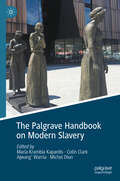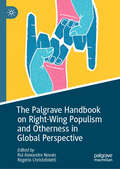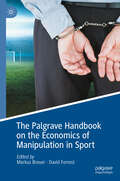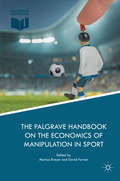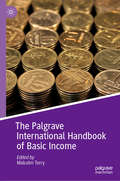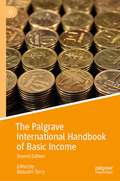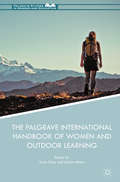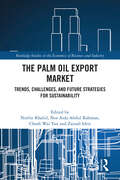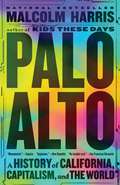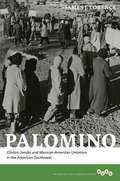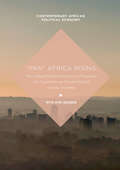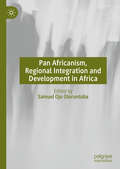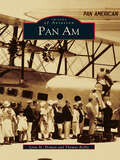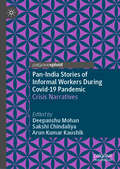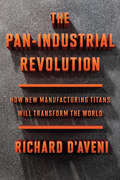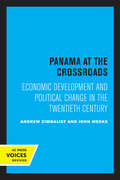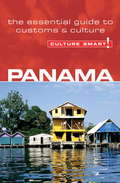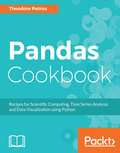- Table View
- List View
The Palgrave Handbook on Modern Slavery
by Maria Krambia Kapardis Colin Clark Ajwang’ Warria Michel DionThis handbook takes a comprehensive approach to studying and understanding modern slavery, particularly forced labour and human trafficking. It considers the historical and cultural roots of modern slavery and suggests that analyzing the issue from humanities, social sciences, criminological, and business perspectives could lead to a better understanding of its emergence worldwide. The handbook also highlights the role of religions/spiritualities and multinational corporations in the expansion of modern slavery and argues that exploring their potential ethical responsibilities is essential. Furthermore, it combines theoretical frameworks of intersectionality and globalization to study the interconnectedness of various factors in shaping and understanding modern slavery. Finally, it contains an impressive range of geographic and conceptual approaches to the problems of combating modern slavery.
The Palgrave Handbook on Right-Wing Populism and Otherness in Global Perspective (Global Political Sociology)
by Rui Alexandre Novais Rogério ChristofolettiThe Palgrave Handbook on Right-Wing Populism and Otherness in Global Perspective argues that a key characteristic of the recent rise in right-wing populist politicians worldwide is the pervasive dynamic of exclusionary conflicts and moral divisions, designated as meta-othering. This is achieved through the use of two distinct forms of otherization: 'upward' othering, which targets the establishment elites and their associates, and 'downward' othering, which involves demeaning and scapegoating certain out-groups or external outsiders. The Handbook takes a multidisciplinary approach and focuses on recent real-world expressions of right-wing populist tactics to justify, strengthen, or instrumentalize alterity narratives and claims. It provides a comprehensive analysis of manifestations of right-wing populism othering from diverse cases and variations around the world with a particular emphasis on including examples from the Global South.
The Palgrave Handbook on the Economics of Manipulation in Sport
by Markus Breuer David ForrestThis updated and expanded new edition explores how sport is manipulated for economic and political gain. Manipulation in sport takes many forms and carefully selected chapters detail the broad variety of ways this can take place. The different types of manipulation in sport are outlined, including doping, match-fixing, and breaking Financial Fair Play, to provide a foundation to the topic. The role of legal interventions, in particular the Court of Arbitration for Sport, is discussed, alongside the governance of sports organisations and the corruption of sporting organisations, to highlight how sport can be exploited by tainted political regimes. New chapters looking at whistleblowing, sportwashing, e-sports, and horseracing broaden the scope of the book and explore recent debates. This book aims to examine manipulation in sport through the lens of economics, bringing light to the various ways benefits can be gained from rule and regulation breaches. It will be relevant to students and researchers interested in sports economics and sport governance.
The Palgrave Handbook on the Economics of Manipulation in Sport
by David Forrest Markus BreuerSport has enjoyed steadily increasing prominence and economic importance since the Millennium. But threats to its integrity appear to have grown in parallel, undermining the very sense of innocence and fun which is an important part of its appeal. Threats to the spirit of sport come from internal, external and even state actors, who seek either to manipulate events on the field or to exploit the institutions of sport for their own ends. As the reputation of sport becomes more tarnished as a result, its sustainability as a significant part of the entertainment industry is called into question and loss of reputation may even result in decline in recreational play. In this wide-ranging collection of essays, the international team of contributors explores the structural economic sources of the problems that beset sport and address the question of ‘what is to be done?’ through economic reasoning. Specific topics covered include doping, match-fixing for betting or sporting gain, the role of forensic statistics in detecting nefarious activity, issues related to club ownership, corruption in the awarding of mega-events and within sports governing bodies, and the role of the law and the Court of Arbitration for Sport. In the final chapter, the Editors pull together the various strands and propose that policy to mitigate the threat to fair play should be built around two themes: improving sports governance and designing incentives to help actors in sport choose honest over manipulative behaviour. The book will appeal to practitioners from sport management as well as to academics including students and researchers.
The Palgrave International Handbook of Basic Income (Exploring the Basic Income Guarantee)
by Malcolm Torry“This Handbook offers a timely ‘snapshot’ of the fast-moving global debates on Basic Income. Embracing a range of ideological, ethical, historical and cross-national perspectives, it looks at the case for Basic Income through both a focused and a wide-angled lens. Rather than asserting hard and fast conclusions, it ends with the valuable message that context is all.”—Ruth Lister, Loughborough University, UK “A must-read Handbook that provides solid foundations for the growing number of researchers, policymakers and campaigners involved in the ongoing debate on Basic Income."—Rubén M. Lo Vuolo, the Interdisciplinary Centre for the Study of Public Policy, Argentina “A comprehensive, competent, accessible, up-to-date picture of the current state of knowledge and debate on basic income in several disciplines and in many countries.”—Philippe Van Parijs, the University of Louvain, Belgium A Basic Income is an unconditional regular payment for every individual. But is it desirable? And is it feasible? This Handbook brings together scholars from various disciplines and from around the world to examine the history, characteristics, effects, viability and implementation of Basic Income. A variety of pilot projects and ideological perspectives are considered in depth.
The Palgrave International Handbook of Basic Income (Exploring the Basic Income Guarantee)
by Malcolm TorryThis handbook brings together scholars from various disciplines and from around the world to examine the history, characteristics, effects, viability and implementation of basic income. The first edition of this book contributed a comprehensive treatment of multiple aspects of the basic income debate. This updated, expanded edition tackles new topics that are becoming increasingly prominent in the global debate. New chapters are devoted to recent research on the history of basic income; the development and peacemaking potential of basic income in conflict zones; municipal experiments in the United States; requirements for pilot projects and experiments; and the public health implications of basic income. Existing chapters on the implementation of basic income have also been substantially updated to take account of new research on microsimulation, land value tax, local currencies, and blockchain technology and cryptocurrency, along with new material on the increasing use of opinion polls and the difficulties related to that. New political and ethical perspectives on the role of trade unions and their increasing engagement with the basic income debate are also introduced, while the section on pilot projects and experiments has been updated to cover recent political developments. Fully updated to reflect new global developments in the basic income debate, this handbook will be of interest to researchers, teachers and research-oriented policymakers in a range of fields.
The Palgrave International Handbook of Women and Outdoor Learning
by Tonia Gray Denise MittenThis Handbook serves as a starting point for critical analysis and discourse about the status of women in outdoor learning environments (OLEs). Women choose to participate actively in outdoors careers, many believing the profession is a level playing field and that it offers alternatives to traditional sporting activities. They enter outdoor learning primarily on the strength of their enthusiasm for leading and teaching in natural environments and assume the field is inclusive, rewarding excellence regardless of age, gender, socioeconomic status, disability, or ethnicity. However, both research and collective experiences in OLEs suggest that many women feel invisible, relegated, marginalized, and undervalued. In response to this marginalization, this Handbook celebrates the richness of knowledge and practices of women practitioners in OLEs. Women scholars and practitioners from numerous fields, such as experiential outdoor education, adventure education, adventure therapy, and gender studies, explore the implications of their research and practice using poignant examples within their own disciplines. These insights emerge from similar life experiences as women and outdoor leaders in the 1970s to the present. Social inequalities still abound in OLEs, and the Handbook ensures that the contributions of women are highlighted as well as the work that needs to be done to make these spaces inclusive.Global in perspective and capacious in content, this one-stop volume is an indispensable reference resource for a diverse range of academics, including students and researchers in the fields of education, psychology, sociology, gender studies, geography, and environment studies, as well as the many outdoors fields.
Palm Computing, Inc.--1995: Financing Challenges
by Stephanie Dodson Myra M. HartThe president, Donna Dubinsky, and the chairman and founder, Jeff Hawkins, discuss an opportunity to sell their company to U.S. Robotics. They must weigh this option versus accepting venture capital funding, partnering with a large company that could provide distribution channels and capital, or continuing a search for capital from other sources.
Palm Computing, Inc. (A)
by Myra M. HartDiscusses patents, licenses, and deal making in a start-up venture. The entrepreneur, Jeff Hawkins, holds a patent on Palm Print, a pattern recognition algorithm. After licensing Palm Print to his employer, he led three years of development of commercial products for the company. Focuses on Hawkins's efforts to start a new, noncompeting venture that requires cross-licenses for the Palm Print enhancements. The employer wants Hawkins to stay to develop the new products "in-house" and resists making an agreement.
The Palm Oil Export Market: Trends, Challenges, and Future Strategies for Sustainability (Routledge Studies in the Economics of Business and Industry)
by Norlin Khalid Rahman, Nor Aida Abdul Cheah Wai Yan Zainab IdrisThis book provides a comprehensive examination of the palm oil export market, including analysis of its current challenges and move towards sustainability.Adopting a multidisciplinary approach, this volume is written by contributors ranging from the fields of economics, engineering, and chemical sciences. Chapters address a wide range of topics including trade market, environmental sustainability, economic dynamics, and future directions to implement nanotechnology and biowaste recycling in the palm oil industry. They synthesize existing research on the palm oil market, and examine the industry’s transformation efforts via technology adoption, biofuel energy research, and its response to new rules and policies from the EU market.This book would appeal greatly to scholars and researchers on international trade, supply chain management, and economic development, especially those in oil palm production and import countries.
Palma Africana
by Michael Taussig“It is the contemporary elixir from which all manner of being emerges, the metamorphic sublime, an alchemist’s dream.” So begins Palma Africana, the latest attempt by anthropologist Michael Taussig to make sense of the contemporary moment. But to what elixir does he refer? Palm oil. Saturating everything from potato chips to nail polish, palm oil has made its way into half of the packaged goods in our supermarkets. By 2020, world production will be double what it was in 2000. In Colombia, palm oil plantations are covering over one-time cornucopias of animal, bird, and plant life. Over time, they threaten indigenous livelihoods and give rise to abusive labor conditions and major human rights violations. The list of entwined horrors—climatic, biological, social—is long. But Taussig takes no comfort in our usual labels: “habitat loss,” “human rights abuses,” “climate change.” The shock of these words has passed; nowadays it is all a blur. Hence, Taussig’s keen attention to words and writing throughout this work. He takes cues from precursors’ ruminations: Roland Barthes’s suggestion that trees form an alphabet in which the palm tree is the loveliest; William Burroughs’s retort to critics that for him words are alive like animals and don’t like to be kept in pages—cut them and the words are let free. Steeped in a lifetime of philosophical and ethnographic exploration, Palma Africana undercuts the banality of the destruction taking place all around us and offers a penetrating vision of the global condition. Richly illustrated and written with experimental verve, this book is Taussig’s Tristes Tropiques for the twenty-first century.
Palo Alto: A History of California, Capitalism, and the World
by Malcolm HarrisNamed One of the Year's Best Books by VULTURE • THE NEW REPUBLIC • DAZED • WIRED • BLOOMBERG • ESQUIRE • SALON • THE NEXT BIG IDEA CLUBThe history of Silicon Valley, from railroads to microchips, is an &“extraordinary&” story of disruption and destruction, told for the first time in this comprehensive, jaw-dropping narrative (Greg Grandin, Pulitzer Prize-winning author of The End of the Myth). Palo Alto&’s weather is temperate, its people are educated and enterprising, its corporations are spiritually and materially ambitious and demonstrably world-changing. Palo Alto is also a haunted toxic waste dump built on stolen Indian burial grounds, and an integral part of the capitalist world system. In PALO ALTO, the first comprehensive, global history of Silicon Valley, Malcolm Harris examines how and why Northern California evolved in the particular, consequential way it did, tracing the ideologies, technologies, and policies that have been engineered there over the course of 150 years of Anglo settler colonialism, from IQ tests to the "tragedy of the commons," racial genetics, and "broken windows" theory. The Internet and computers, too. It's a story about how a small American suburb became a powerful engine for economic growth and war, and how it came to lead the world into a surprisingly disastrous 21st century. PALO ALTO is an urgent and visionary history of the way we live now, one that ends with a clear-eyed, radical proposition for how we might begin to change course.
Palomino: Clinton Jencks and Mexican-American Unionism in the American Southwest
by James J. LorenceThe first comprehensive biography of progressive labor organizer, peace worker, and economist Clinton Jencks (1918-2005), this book explores the life of one of the most important political and social activists to appear in the Southwestern United States in the twentieth century. A key figure in the radical International Union of Mine, Mill, and Smelter Workers (IUMMSW) Local 890 in Grant County, New Mexico, Jencks was involved in organizing not only the mine workers but also their wives in the 1951 strike against the Empire Zinc Company. He was active in the production of the 1954 landmark labor film dramatizing the Empire Zinc strike, Salt of the Earth, which was heavily suppressed during the McCarthy era and led to Jencks's persecution by the federal government. Labor historian James J. Lorence examines the interaction between Jencks's personal experience and the broader forces that marked the world and society in which he worked and lived. Following the work of Jencks and his equally progressive wife, Virginia Derr Jencks, Lorence illuminates the roots and character of Southwestern unionism, the role of radicalism in the Mexican-American civil rights movement, the rise of working-class feminism within Local 890 and the Grant County Mexican American community, and the development of Mexican-American identity in the Southwest. Chronicling Jencks's five-year-long legal battle against charges of perjury, this biography also illustrates how civil liberties and American labor were constrained by the specter of anticommunism during the Cold War. Drawing from extensive research as well as interviews and correspondence, this volume highlights Clinton Jencks's dramatic influence on the history of labor culture in the Southwest through a lifetime devoted to progress and change for the social good.
Pal's Sudden Service-Scaling an Organizational Model to Drive Growth
by Francesca Gino Bradley R. Staats Gary P. PisanoPal's Sudden Service has developed a unique operating model and organizational culture in the quick service restaurant business. With a deep emphasis on process control and improvement, zero defects, extensive training, and a high level of employee engagement, Pal's has been able to achieve excellent operating and financial performance. The case examines the challenges it potentially faces as it contemplates growing the chain significantly from the 28 units it currently operates.
The Pampered Chef
by Doris ChristopherAt Berkshire Hathaway, we like companies that are easy to understand. Doris Christopher’s “keep it simple” approach has a lot to teach anyone who is reaching for the American Dream. Frankly, if I can’t understand a company’s business, I figure their customers must have a pretty hard time figuring it out, too. I would challenge anyone on Wall Street to take $3,000 and do what Doris Christopher has done: build a business from scratch into a world-class organization. But follow the simple steps in this book, and it just might happen. Come see me in Omaha when you’ve put together your own recipe for success; we pay cash and Bershire’s check will clear. In the meantime, read this book. Then, read it again. -- Warren Buffet from the foreword to The Pampered Chef The Pampered Chef is Doris Christopher’s extraordinary account of how she turned an innovative concept and $3,000 investment into a business with annual sales approaching the billion-dollar mark. It is packed with real-life lessons and inspiring insights for small-business owners and aspiring entrepreneurs. In 1980 Doris Christopher, a former home economist and teacher, was itching to get back into the workforce after an eight-year hiatus as a stay-at-home mom. Drawing on her personal and professional expertise, and determined to make cooking easier and more convenient for families, she started selling high-quality kitchen tools through cooking demonstrations to groups of women in their homes. Today, the company she started in her basement, The Pampered Chef, is celebrating its twenty-fifth anniversary and has grown into a corporation with tens of thousands of independent kitchen consultants. Now owned by Berkshire Hathaway, The Pampered Chef’s Kitchen Consultants present more than a million Kitchen Shows a year, attended by more than 12 million people. THE PAMPERED CHEF is the story of the vision, energy, hard work, and chutzpah that drove Christopher and her company to the height of success. She describes her early days as a “one-woman show,” chronicles the company’s gradual expansion, its challenges and growing popularity, and the process, offers invaluable advice and sound strategies on how to found and grow a business, including: Hard learned lessons for start-up entrepreneurs How to create a business concept and set your priorities Knowing when to expand and when to slow growth so that demand doesn’t overwhelm your operations or supplies How to counter the naysayers and deal with adversity Today, as at the company’s founding, achieving a better balance between work and family remains central to The Pampered Chef’s mission. THE PAMPERED CHEF brings Christopher’s recipe for success to women, and men, everywhere.
“Pan” Africa Rising: The Cultural Political Economy of Nigeria’s Afri-Capitalism and South Africa’s Ubuntu Business (Contemporary African Political Economy)
by Rita Kiki EdozieThis book uses Nigeria’s Afri-capitalist and South Africa’s Ubuntu Business models as case studies that reconcile the tension between Africa Rising and Pan African economics, presenting their convergence as Africa’s viable Third Way route to global development. In presenting Afri-capitalism and Ubuntu Business as national, business sector manifestations of a “new” Pan Africanism, the author explores Africa’s “culturalist” path in engaging the international political economy. This is an African customized engagement that parallels the alternative models of China’s “market-socialism” and Latin America’s “21st C Socialism”. All present alternatives to realist, liberal, and structuralist standpoints, inclining instead toward constructivist political economies derived from the perspectives and subject conditions of African economic histories, socio-cultures, alternative modernities, and agent-led initiatives.
Pan Africanism, Regional Integration and Development in Africa
by Samuel Ojo OloruntobaThis edited volume addresses the accomplishments, prospects and challenges of regional integration processes on the African continent. Since regional integration is a process that ebbs and flows according to a wide range of variables such as changing political and economic conditions, implications and factors derived from the vagaries of migration and climate change, it is crucial to be cognizant with how these variables impact regional integration initiatives. The contributors discuss the debates on Pan-Africanism and linking it with ongoing discourses and policies on regional integration in Africa. Other aspects of the book contain some of the most important topic issues such as migration, border management and the sustainable development goals. This content offers readers fresh and innovative perspectives on various aspects of sustainable development and regional growth in Africa.
Pan Am (Images of Aviation)
by Lynn M. Homan Thomas ReillyPan American World Airways could be considered a corporate Cinderella--a rags-to-riches-and-back-again phenomenon. From its founding in 1927 and its relatively obscure inauguration as a mail carrier on a 90-mile mail run from Florida's Key West to Cuba, Pan Am's route system grew to span the globe. The company that would eventually become famous for its blue-and-white-world logo grew into a conglomerate of hotels, airlines, business jets, real estate, a helicopter service, and even a guided missiles range division. But financial problems plagued Pan Am in its last two decades, and in 1991, Pan American World Airways ceased flying after 64 years of service.The story of Pan Am is as much the story of president Juan T. Trippe as it is an account of airplanes, pilots, flight attendants, andglamorous destinations. As the company moved throughout the world building airfields from jungles, crossing oceans, and forcingthe development of new airplanes, it was Trippe's airline and his vision. A global pioneer, Pan Am was the first airline to use radiocommunications, to employ cabin attendants and serve meals aloft, and to complete an around-the-world flight. The company'sachievements were legendary, but its failures, tragedies, and disasters were also part of a complex corporate life.
Pan-India Stories of Informal Workers During Covid-19 Pandemic: Crisis Narratives
by Deepanshu Mohan Sakshi Chindaliya Arun Kumar KaushikThis book aims to delve into the application of feminist ethnography by engaging with the lived experiences of vulnerable workers, occupied by India’s informal workforce, across its deeply stratified labour-market landscape. Set up and organized in a diverse spatial trajectory through identified case studies from across India, the book, in a post pandemic context, aims to study, critically reflect on the vulnerable state of India’s workforce, capturing the daily emergencies, livelihood of marginalized communities. Case studies in the book feature the pandemic-crisis narratives of farmers, fisherfolk, factory workers, artisans, small scale entertainment providers, sanitation, and waste workers, to name a few.By understanding the intersectional dimensions of social structures like caste, gender, and class our case studies in the book also attempt to unpack the ‘dualities’ present in the contemporary understanding of India’s labour market. Reflective discussions with field ethnographers through first-person narratives help documenting their own observations from different case studies, while focusing on interactions on how to work through power dynamics and varied positionalities across dynamic field sites marked with different spatial characteristics. The text is primarily aimed at students and peer scholars of development studies, or for those who interested in learning about the application of ethnographic methods to studying/understanding the governing dynamics of informality across India and South Asia.
The Pan-Industrial Revolution: How New Manufacturing Titans Will Transform the World
by Richard D'AveniThe acclaimed author of Strategic Capitalism presents a provocative new vision of global industry in the age of 3-D printing: &“essential business reading&” (Kirkus, starred review). With books like Hypercompetition and Strategic Capitalism, Richard D&’Aveni has established himself as a business strategist of uncanny prescience. In The Pan-Industrial Revolution, he demonstrates how the advent of industrial‑scale 3‑D printing is already happening under the radar, and that it will have a far‑reaching impact that most corporate and governmental leaders have yet to anticipate or understand. 3-D printing, now called additive manufacturing, has moved far beyond a desktop technology used by hobbyists to churn out trinkets and toys. In this eye-opening account, D&’Aveni reveals how recent breakthroughs have been secretly adapted by Fortune 500 companies to revolutionize the manufacture jet engines, airplanes, automobiles, and so much more. D&’Aveni explains how this technology will transform the landscape of manufacturing, and the dramatic effect this change will have on the world economy. A handful of massively powerful corporations—what D&’Aveni calls pan‑industrials—will become as important as any tech giant in re-structuring the global order.
Panama at the Crossroads: Economic Development and Political Change in the Twentieth Century
by Andrew Zimbalist John WeeksIn December 1989, the United States invaded Panama, deposed its government, and established another in its place. While this act of violent intervention brought Panama to public attention, the justifications for it obscured the underlying instabilities that have plagued the country throughout its history. Although a stated purpose of the invasion was to remove one man, Manuel Noriega, from power, Panama at the Crossroads demonstrates that the crisis sweeping Panama in the late 1980s was not caused by one man, but in fact derived from the history of U.S. domination and the nature of Panamanian society itself. Panama is located at a crucial geographic crossroads, a fact that has greatly influenced the country's history since the sixteenth century. Labor scarcity and inhospitable terrain, joined with its location, contributed to the mercantile orientation of Panama's economy. Accordingly, the country's politics and economics have been consistently dominated by foreign trading interests, first from Spain, then Colombia and the United States. Now in the 1990s, Panama stands at a historical and economic crossroads, and according to Zimbalist and Weeks its traditional entrepôt institutions are no longer able to promote and sustain growth. Before building the basis for long-term economic expansion, Panama must first undo the devastating economic and political damage engendered by nearly three years of U.S. economic sanctions and the U.S. invasion. In this timely book, Zimbalist and Weeks document the origins and characteristics of this crossroads. Their analysis points the way to a more encompassing and equitable strategy for Panama's economic development. This title is part of UC Press's Voices Revived program, which commemorates University of California Press’s mission to seek out and cultivate the brightest minds and give them voice, reach, and impact. Drawing on a backlist dating to 1893, Voices Revived makes high-quality, peer-reviewed scholarship accessible once again using print-on-demand technology. This title was originally published in 1991.
Panama - Culture Smart!
by Heloise CrowtherCulture Smart! provides essential information on attitudes, beliefs and behavior in different countries, ensuring that you arrive at your destination aware of basic manners, common courtesies, and sensitive issues. These concise guides tell you what to expect, how to behave, and how to establish a rapport with your hosts. This inside knowledge will enable you to steer clear of embarrassing gaffes and mistakes, feel confident in unfamiliar situations, and develop trust, friendships, and successful business relationships.Culture Smart! offers illuminating insights into the culture and society of a particular country. It will help you to turn your visit-whether on business or for pleasure-into a memorable and enriching experience. Contents include* customs, values, and traditions* historical, religious, and political background* life at home* leisure, social, and cultural life* eating and drinking* do's, don'ts, and taboos* business practices* communication, spoken and unspoken"Culture Smart has come to the rescue of hapless travellers." Sunday Times Travel"... the perfect introduction to the weird, wonderful and downright odd quirks and customs of various countries." Global Travel"...full of fascinating-as well as common-sense-tips to help you avoid embarrassing faux pas." Observer"...as useful as they are entertaining." Easyjet Magazine"...offer glimpses into the psyche of a faraway world." New York Times
The Panama Papers: Breaking the Story of How the Rich and Powerful Hide Their Money
by Frederik Obermaier Bastian ObermayerFrom the winners of the 2017 Pulitzer Prize for Explanatory Reporting 11.5 million documents sent through encrypted channels. The secret records of 214,000 offshore companies. The largest data leak in history. In early 2015, an anonymous whistle-blower led investigative journalists Bastian Obermayer and Frederik Obermaier into the shadow economy where the super-rich hide billions of dollars in complex financial networks. Thus began the ground-breaking investigation that saw an international team of 400 journalists work in secret for a year to uncover cases involving heads of state, politicians, businessmen, big banks, the mafia, diamond miners, art dealers and celebrities. A real-life thriller, The Panama Papers is the gripping account of how the story of the century was exposed to the world.
Pandas Cookbook
by Ted PetrouThis book is for Python developers who wish to perform data analysis and scientific computing with Python. Those who wish to implement data analysis in Python will need to use Pandas at one point or another—and this book will come very handy. Examples are suitable for both novice and advanced users, as they cover a variety of real-world problem data sets.
